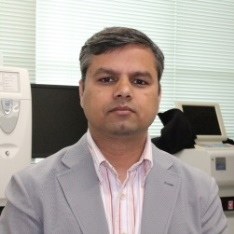
ALUMNI STORIES:Md Asaduzzaman
Name of United Graduate School of Agricultural Sciences:Tottori University
Assigned university:Shimane University
Specialized field:Greenhouse crop production, LED and Plant factories
Research theme:
○Quality improvement of horticultural crops providing Human Health Benefits through hydroponic nutrient management and environmental control modification
○Autotoxicity in vegetables and ornamentals and their control measures in hydroponics
Obtained (planned) degree/date:Doctor of Philosophy PhD (Horticulture) Obtained in 13 September 2013
Message
Dr. Md. Asaduzzaman is currently working as Senior Researcher at Olericulture Division, Horticulture Research Centre, Bangladesh Agricultural Research Institute (BARI), Gazipur, Bangladesh. He has about 15 years of agricultural research experience at BARI since 2007. His main research focuses are the development of hydroponic techniques for fruits, vegetables and ornamentals in greenhouse, and also production of specialty crops under Controlled Environment Agriculture (CEA). His basic research project includes studying the autotoxicity, a phenomenon of intraspecific allelopathy in vegetables and ornamentals through hydroponics, and developing suitable control measures to overcome.
He received Ph.D. in Horticulture from The UGSAS, Tottori University, Japan in 2013. He awarded the prestigious JSPS Postdoctoral Research Fellowship 2016 in Japan and conducted advanced research on the mechanism of resistance to phenolics from strawberry root exudates under autotoxicity in recycled hydroponics. In addition, he also conducted collaborative research using BARI developed tomato varieties through hydroponics and soilless cultures. Through his higher studies, he gained research experience in producing low potassium melon and strawberry for the Chronic Kidney Disease (CKD) patients through hydroponic nutrient management in glass houses, plant factories and also in soilless culture using perlite substrate in the plastic houses. He also conducted a series of experiments on the up and down regulation of minerals in several leafy vegetables and bioactive compounds in wasabi under artificial grow lights/LEDs in Plant Factory supported research facticity at Shimane University, Japan.
In recycled or closed hydroponics nutrient solution for plant cultivation, can effectively be used by the plants and also reduce environmental pollution trough the discharge of waste nutrient solution. However, in this system, crop yield is decreased due to accumulation of inhibitory root exudates. Therefore, he studied the autotoxicity in strawberry, beans, ornamentals and leafy vegetables through hydroponics methods where this phenomenon can be understand clearly. In this regard his research also emphasized towards the development of several suitable and effective means to overcome autotoxicity through removing or degrading phytotoxic root exudates from the nutrient solution.
In Bangladesh his research projects includes developments of coco-coir based horticultural substrate mixtures which can be used for large scale soilless production of vegetables and ornamentals and also in the urban horticulture. Recent implementation of his research results in the regional agricultural stations of BARI showed great promise to the Bangladesh agriculture, as the Govt. is emphasizing mechanized and commercial cultivation of vegetables instead of traditional soil cultivation. The outcomes of his research projects on soilless cultivation created an inspiration to the young unemployed people who can engage in the modern agricultural production. In this research, his current research focuses are emphasizing the coco-coir based substrate mixture for developing horticultural substrate bag with commercial value in Bangladesh.
Beside development of soilless substrate and system for growing high value crops, he is trying to produce production of leafy vegetables that can be eaten as fresh salad. Traditionally peoples of Bangladesh eat coriander and cucumber as fresh. Due to intake of oily and spicy foods with large amount of rice, obesity becoming a national health problem with different common disease likes diabetics, high blood pressure, heart failure etc. In this regard, he is doing research to bring changes in people’s dietary composition by including fresh leafy greens and herbs which will provide health benefits to them. Based on his previous research experience in Japan, he is establishing collaboration with the medical doctors for inviting research demand to produce special dietary components or vegetables like low potassium content leafy vegetables, melon and strawberries for patients with chronic kidney disease. Through his research activities he is highlighting stable production of leafy vegetables for supplying the restaurants, and emerging super markets in Bangladesh. In this regards, he is giving support to the private commercial hydroponic farms around his research institutes to develop Nutrient Film Techniques (NFT) and Vertical Farming using artificial grow lights. In recognition of his remarkable contribution the field of Agricultural Science, the Bangladesh Academy of Science awarded Dr. M. Asaduzzaman with the prestigious BAS-TWAS Young Scientists Prize 2016.
Laboratory of Molecular Breeding and Cytogenetics: http://www.bari.gov.bd/
Professional IDs: https://orcid.org/0000-0001-5516-4262
Major published papers:
- Asaduzzaman, M. and Asao, T.(Eds.). Vegetables – Importance of Quality Vegetables to Human Health. ISBN: 978-953-51-5975-9. August 22nd 2018. InTech Open, London, UK.
- Asaduzzaman, M. (Eds.).Controlled Environment Agriculture- Production of Specialty Crops Providing Human Health Benefits through Hydroponics. ISBN: 978-1-63484-517-5, March, 2016. NOVA Science Publisher, NY.
- Asaduzzaman, M. (Eds.).Soilless Culture – Use of Substrates for the Production of Quality Horticultural Crops, ISBN: 978-953-51-4180-8, February 25th 2015. InTech Open, Croatia.
- Asaduzzaman, M. and Asao, T. 2020. Autotoxicity in strawberry under recycled hydroponics and its mitigation methods. Hort. J. 89(2): 124-137. https://doi.org/10.2503/hortj.UTD-R009; IF: 1.176
- Asaduzzaman, M., Talukder MR., Tanaka, H., Ueno, M., Kawaguchi, M., Yano, S., Ban, T. and Asao, T. 2018. Production of Low-Potassium Content Melon Through Hydroponic Nutrient Management Using Perlite Substrate. Front. Plant Sci. 9: 1382. IF: 4.402
- Asaduzzaman, M., Kobayashi, Y., Mondal, FM., Ban, T., Matsubara, H., Adachi, F. and Asao, T. 2013. Growing carrots hydroponically using perlite substrates. Sci. Hortic. 159: 113-121. IF: 2.769
- Asaduzzaman, M., Kobayashi, Y., Isogami, K., Tokura, M., Tokumasa, K. and Asao, T. 2012. Growth and yield recovery in strawberry plants under autotoxicity through electrodegradation. Eur. J. Hort. Sci. 77(2): 58-67. IF: 1.182
- Asaduzzaman, M. and Asao, T. 2012. Autotoxicity in beans and their allelochemicals. Sci. Hortic. 134: 26-31. IF: 2.769
